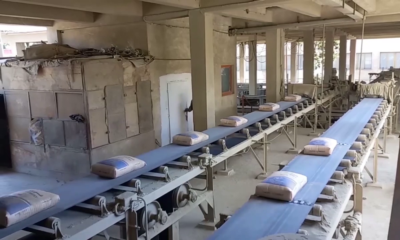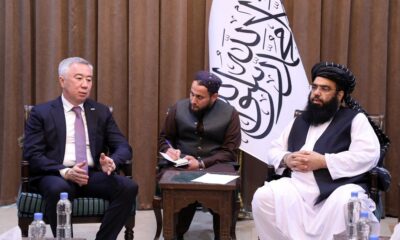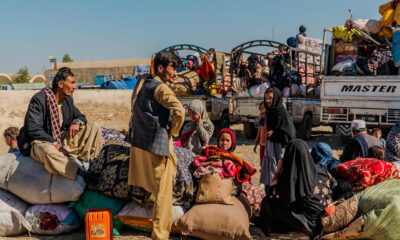Latest News
Baradar discusses water rights issue with Iran’s energy minister
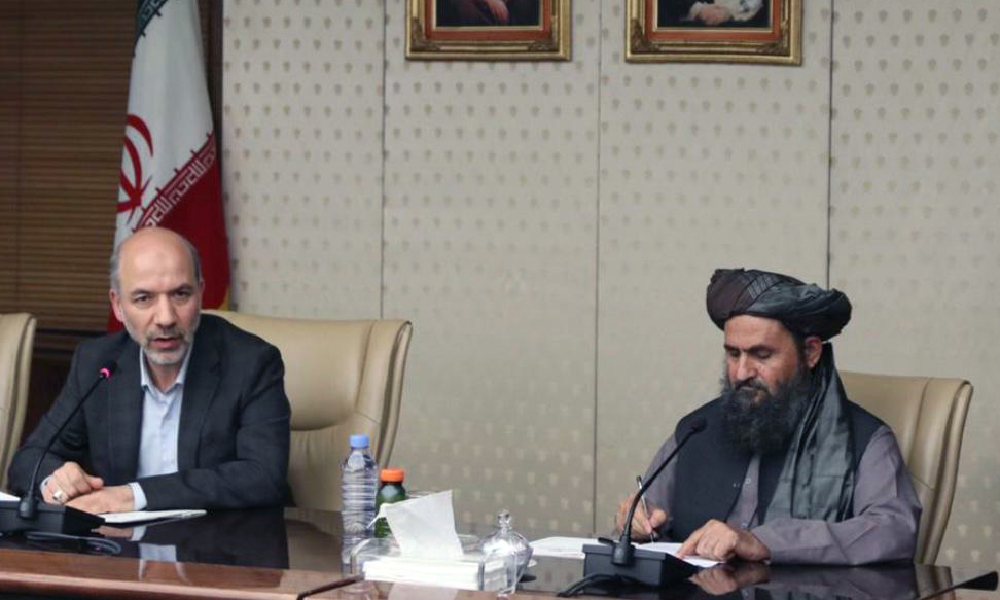
Mullah Abdul Ghani Baradar, Economic Deputy Prime Minister of the Islamic Emirate of Afghanistan (IEA), met with Iran’s Energy Minister Ali Akbar Mehrabian on Monday to discuss a number of issues including that relating to water management.
In addition to this, the two officials also discussed the need for Iran’s technical cooperation in the field of electricity production in Afghanistan, as well as investments, the use of advanced irrigation systems in agriculture, and drought relief programs for both countries. The strengthening of bilateral ties was also discussed.
Baradar said the recent droughts have had a bad effect on water resources in the region, especially in Afghanistan.He said surface and underground water levels have decreased significantly.
“In many areas, people inside the country have been forced to leave their places and some others have been forced to migrate again [due to water shortages],” Baradar said.
Baradar also said that some time ago, a technical delegation of the Islamic Republic of Iran visited the Helmand River area where they agreed that the river’s water level had dropped. According to Mullah Baradar, Afghanistan, which has enough resources to produce hydroelectric power, along with wind, solar and coal-driven power.
Iran’s Minister of Energy, Ali Akbar Mehrabian, said Iran was also struggling with drought-related problems. He did however assure Baradar of Iran’s support in providing technical cooperation in various sectors including electricity production.
This discussion followed Baradar’s earlier meeting with Iran’s Minister of Interior, Ahmad Wahidi.
The meeting commenced with the Deputy Prime Minister expressing gratitude to the Iranian government for its unwavering support and assistance to the Afghan people during challenging times.
He noted that Iran has consistently provided aid to Afghans in distress and continues to host millions of Afghan refugees.
He highlighted the importance of further cooperation between the two nations in the areas of economics and security, emphasizing that a stable and prosperous Afghanistan benefits both the region and the world.
He also made a request for handing over Afghan prisoners accused of various crimes in Iran. He reiterated the Islamic Emirate’s commitment to enhancing Afghanistan’s economic situation, enabling Afghan citizens to lead dignified lives and serve their compatriots within their homeland.
Baradar underlined the priority of combating narcotics, noting significant progress in reducing drug cultivation and trafficking in Afghanistan.
Iran’s Minister of Interior Ahmad Wahidi welcomed the Afghan delegation, highlighting the opportunity for Iran and Afghanistan to strengthen economic and commercial ties.
He emphasized Iran’s support for the transit of Afghan products through its territory to boost Afghanistan’s exports and asked the Afghan side to share their products for the purpose of marketing in Iran.
Wahidi viewed the settlement of Afghan refugees in Iran as a favorable business opportunity and suggested establishing a joint committee between both countries to address refugee issues.
He further stressed Iran’s priorities, which include border security, the establishment of common markets, anti-drug efforts, trade and transit development, and improving the quality of life in border areas.
The meeting encompassed discussions on several key initiatives, including the construction of a railway from Chabahar to Nimruz, Helmand, and Kandahar, the educational opportunities for Afghan students, Iran-China connectivity through Afghanistan, and linking Uzbekistan to the Gulf of Oman via Afghanistan and then Iran.
The Iranian delegation emphasized the importance of establishing a connection with China through Afghanistan, deeming it beneficial for both nations.
Baradar also acknowledged the significance of this initiative and pledged to expedite its implementation.
Latest News
Ghori State Cement in Baghlan increases production
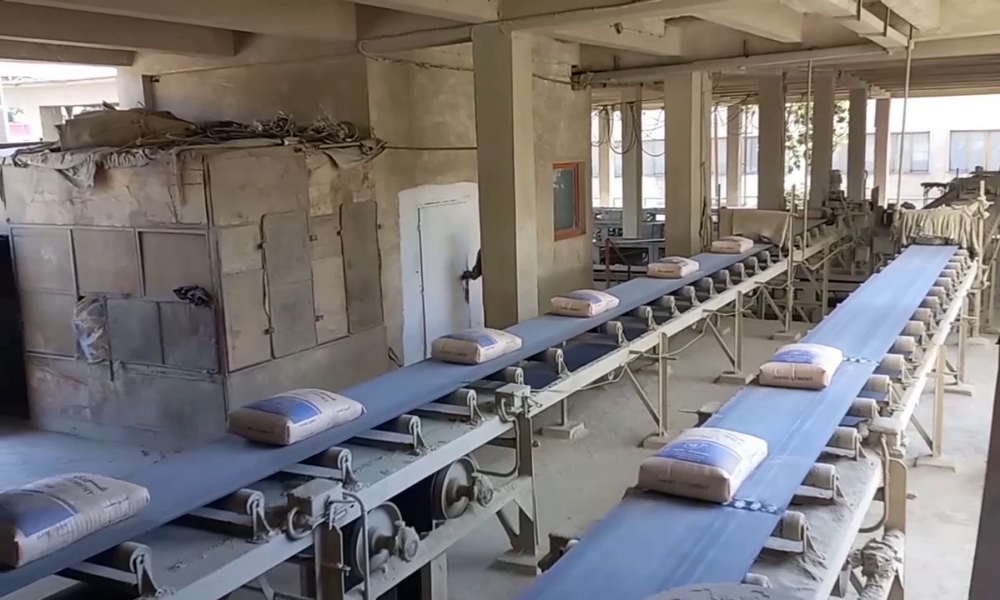
Officials at Ghori State Cement in Baghlan province say the amount of cement produced at this plant has increased compared to the past.
According to company officials, 150,000 tons of cement was produced in 1402 [solar year] and they are trying to increase the amount to 180,000 tons this year.
“Last year, we successfully produced 150,000 tons of cement and sold it to the market. Fortunately, in 1402, we had more than 200 million afghanis in revenue,” said Abdul Wakil Qayumi, financial and administrative deputy of the company.
The plant officials stated that efforts are underway to increase the production capacity, and with the increase of the production capacity, they will produce 1000 bags of cement per day.
“Currently, our four ovens are active, and we produce approximately 1,000 to 1,200 tons of cement in twenty-four hours,” said Mohammad Tahir, packaging manager for the company.
In this company, jobs are created for 750 individuals, and some workers have asked the traders to invest in the country and provide work for young people.
“Some more factories should be built in our country so that less foreign cement is imported into the country and we use our own products,” said one of the company workers.
Ghori Baghlan Cement Company was established about 40 years ago and is considered one of the largest cement production companies in Afghanistan.
The management of this company is carried out by the National Development Corporation (NDC).
Latest News
Regional countries should jointly expand stability and development: Deputy PM
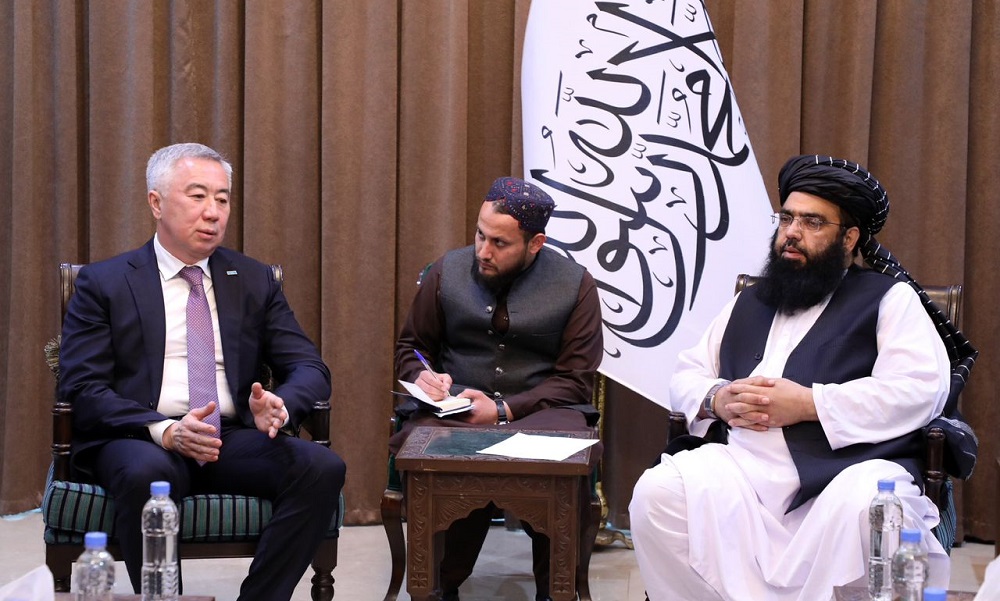
Mawlawi Abdul Kabir, Political Deputy Prime Minister, has said in a meeting with the Deputy Prime Minister of Kazakhstan in Kabul that regional countries should play their role in the implementation of large regional projects.
Kabir also invited Kazakh businessmen to invest in Afghanistan, his office said in a statement.
He added that the Islamic Emirate fully controls Afghanistan’s borders, has eliminated drugs and corruption, and restored national sovereignty.
According to the statement, Deputy Prime Minister of Kazakhstan Serik Zhumangarin appreciated the progress made by the Islamic Emirate in Afghanistan and said that his country is ready for long-term trade, transit and investment relations with Afghanistan.
Zhumangarin expressed his country’s readiness to grant scholarships to Afghan youth and added that Afghanistan is currently an example of a peaceful country in the region, and due to this, the world wants to establish relations with the Islamic Emirate in various fields.
He also called for the start of direct flights between Kabul and Almaty and said that his country is ready for bilateral cooperation with the Afghan government in the cultural field.
Latest News
Red Cross official seeks ‘staggered’ return of Afghan refugees from Pakistan
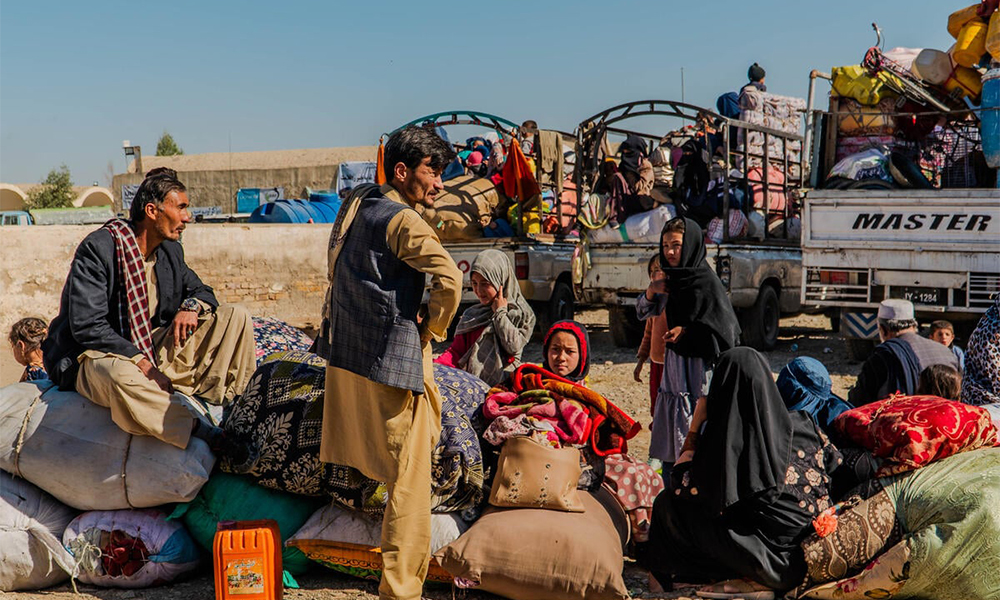
A senior Red Cross official has called for the return of Afghan refugees from Pakistan to occur “in a more staggered way” so Afghanistan can better absorb them.
“It will be important to work with the government of Pakistan in 2024 to ask that if there are going to be returnees,” that they arrive “in smaller numbers at a time just so it is more manageable on the Afghan side,” said Alexander Matheou, regional director, Asia Pacific Region for the International Federation of the Red Cross, Voice of America (VOA) reported on Saturday.
Speaking in the Qatari capital, Doha, Matheou told journalists on Friday the challenges facing Afghan returnees from Pakistan was one of several pressing issues he discussed with the officials of the Islamic Emirate in Kabul.
“You will be aware that over half a million have crossed the border over recent months, and it is likely that we will see large numbers of new arrivals in the coming months,” he said.
“I imagine this is probably the largest population flow in a short period of time in Asia since the population movement from Myanmar into Bangladesh in 2017,” he added. “So, it is a significant event.”
Since October, Pakistan has expelled more than 500,000 Afghan refugees who lacked proper documentation.
Matheou noted many of the returnees have lived in Pakistan for decades and are ill-equipped to begin a new life in a country that to them is unknown, without government or international support.
He described the returnees as being in generally poor health, especially the children, who account for nearly half of all returnees.
“The evidence of that was we visited clinics where they reported a real spike in cases of acute malnutrition coming from the arrivals from Pakistan.
“We visited routine immunization programs of the IFRC and the Afghan Red Crescent in the villages, and there it was clear looking at the children that as well as being anemic, you could see wasting and stunting among the children,” he said.
-

 World5 days ago
World5 days agoNorth Korea officials visit Iran in a rare public trip
-

 Sport4 days ago
Sport4 days ago‘Serious talent’ Fraser-McGurk bonds with Warner to light up IPL
-

 Latest News4 days ago
Latest News4 days agoOver 1,000 Afghan refugees forced out of Pakistan in one day
-

 Sport2 days ago
Sport2 days agoAfghanistan beat Iraq 5-3, inch closer to Futsal World Cup berth
-

 Regional2 days ago
Regional2 days agoNew UK sanctions target Iranian drone industry
-

 Regional4 days ago
Regional4 days agoTurkey accuses U.S. of double standards over Gaza in rights report
-

 Latest News2 days ago
Latest News2 days agoEU allocates 17 million euros to support Afghans on the move
-

 Latest News2 days ago
Latest News2 days agoPakistan extends registered Afghan refugees’ stay till June 30




